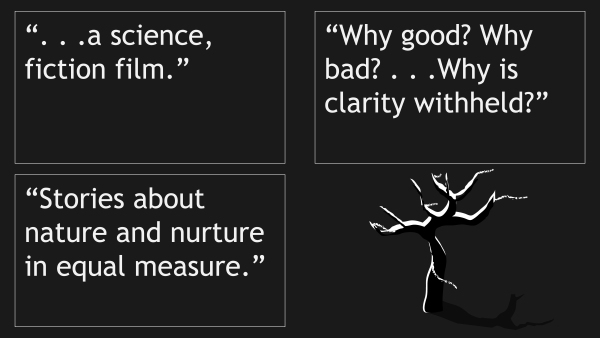". . .a science, fiction film."

Fragile and grand in its insignificance, life is soft in a deafening universe. It comes in short moments and it's remembered in even fewer of them. We cannot meditate on its expansiveness without dividing ourselves from it, distancing ourselves from the only thing that makes us tangible, pondering theory and meaning, pondering our own biology and our own ego.
The human spirit is boundless, should we desire it to be, capable of comprehending our place and our size in ways that would be heresy in centuries past. The question now isn't "Who, or where, do we come from?" but "What do we come from?" We most certainly go to death, if that even is a thing worth mentioning. James Cameron once said that nobody every really dies in science-fiction.
The Tree of Life isn't a science-fiction film. It's a science, fiction film.
Addressing science and addressing fiction as vital entities that will create life, human life, in particular, it is devoid of superficial meaning, just as human life is, particularly when framed against the universe's very creation. Even from mankind's limitations, physical or otherwise, the film presents us humans as symmetrical with The Big Bang itself. Small in some ways, but so large in more, because we make ourselves thusly. It's filmed with the hopes that some day a poet from another planet will find it in a time-capsule and learn from humanity's intimacy with life itself. Optimistic and childish and fascinated, the story is formless and it scatters time as if it were a handful of salt. It endures because we viewers demand that it endure. We will make story and find story if we can.
It's story is questions:
- "Why good?"
- "Why bad?"
- "Why hurt, and why happiness, and why anger, and why are we blessed with such potential, and why do we come across disparity?"
- "Why is clarity withheld?"
Because life is an implausible, wide thing. Run these questions alongside any family and you will find limitless stories -- basic, but all unique. It's startling and realistic, like one hundred brief stories about the same person in a small-town newspaper. Stories about nature and nurture in equal measure. They combine to make the titular Tree of Life.
And yet, there are the laws erected around us, and then there's assumed fiction that goes defied, again circling back to questions that we aren't really looking for answers to, but are looking more for affirmation and identification from things capable of doing harm. They fear the ones they love and their humanity, so the family in the movie, the boys in particular, search for questions that will turn authorities into fiction and expose them as liars -- innocent logic applied, hoping to extract meaning. That desperation works its way up the chain with the parents asking equally desperate questions of God, and then the film suggests that God has to go ahead and ask these things of all of Creation, whether He invented it or not. Authority is never too far away, lurking and judgmental in the background, hanging overhead like an angry parent, a god, or a blinding sun, the last of which being present in innumerable shots throughout the film.
That presence is terrifying and the movie is oftentimes terrifying, placing the death of the middle brother early in the movie and then flashing back to let the rest of the story build towards that event. This, like the movie's frequent, whispering narration from various characters, is cruel. There is no shelter in these internal monologues, just confusion, regret, and dread. The boys don't initially have the ability to actually harm each other -- time goes by though. Rough-housing inside becomes recklessness climbing trees becomes firecrackers becomes brotherly dares and BB guns. Eventually, it happens, and there's the death. It's never shown on-screen, we only see the emotional aftermath.
A decent metaphor for mankind as a species.
In the future, where the oldest son is grown, his life is a lucid nightmare. The world is a gray city full of deaf-mutes. He's constantly rising in an elevator that blinks mechanically like a death-bed heart-monitor. The events in his adult life are cold, fragmented, meaningless, and difficult to place -- a result of his grief. Without warning, he's wandering a desert until he finds his family; father, mother, brothers, exactly as they should be, happy, on a beach, wandering together until all of the light fades at the end of the day.
-- Alex Crumb (originally published 1/11/12)
Twitter | Facebook
Recommended stories
Jane Eyre (2011) Review | From the director of True Detective Season 1
&
I Watched Twilight Saga: Breaking Dawn - Part II, So You Won't Have To

